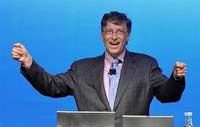
科目: 來(lái)源:不詳 題型:閱讀理解

| A.57 billion dollars | B.50 billion dollars | C.1.5 billion dollars | D.20 billion dollars |
| A.turmoil on the stock and housing market |
| B.media and financial data network |
| C.rising oil and dizzy art prices |
| D.investment |
| A.tell the readers that television stars make money easily |
| B.prove that a millionaire can become a billionaire |
| C.women can also be billionaires |
| D.tell the readers that most of the billionaires are self-made |
| A.one earns much and also loses much |
| B.stability of markets has much effect upon people’s wealth |
| C.the computer industry makes more billionaires |
| D.young people can also be billionaires |
| A.Bill Gates Leading World’s Richest People Again |
| B.What Made Billionaires |
| C.Self-Made Billionaires |
| D.Biggest Gainer and Biggest Loser |
查看答案和解析>>
科目: 來(lái)源:不詳 題型:完形填空
查看答案和解析>>
科目: 來(lái)源:不詳 題型:完形填空
查看答案和解析>>
科目: 來(lái)源:不詳 題型:完形填空
查看答案和解析>>
科目: 來(lái)源:不詳 題型:閱讀理解
查看答案和解析>>
科目: 來(lái)源:不詳 題型:閱讀理解
查看答案和解析>>
科目: 來(lái)源:不詳 題型:完形填空
查看答案和解析>>
科目: 來(lái)源:不詳 題型:完形填空
查看答案和解析>>
科目: 來(lái)源:不詳 題型:完形填空
查看答案和解析>>
科目: 來(lái)源:不詳 題型:閱讀理解
| A.was a great English scientist |
| B.a(chǎn)lways liked doing the experiments that others thought difficult |
| C.thought even the simplest thing was important |
| D.didn’t get well with others |
| A.throw away | B.store up |
| C.put to use | D.realize |
| A.convince us that Charles Darwin, Galileo and Newton are the greatest scientists in the world |
| B.draw the conclusion that basic sciences are simple things |
| C.prove that two sheets of paper, with the same size and shape, will fall at the same speed |
| D.draw our attention to everyday happenings around us |
| A.Darwin really did fools experiments. |
| B.According to some people Darwin did foolish experiments. |
| C.It is believed by all the people that things could be important though they seemed to be simple. |
| D.Galileo and Newton worked out ancient Greek physics. |
查看答案和解析>>
百度致信 - 練習(xí)冊(cè)列表 - 試題列表
湖北省互聯(lián)網(wǎng)違法和不良信息舉報(bào)平臺(tái) | 網(wǎng)上有害信息舉報(bào)專(zhuān)區(qū) | 電信詐騙舉報(bào)專(zhuān)區(qū) | 涉歷史虛無(wú)主義有害信息舉報(bào)專(zhuān)區(qū) | 涉企侵權(quán)舉報(bào)專(zhuān)區(qū)
違法和不良信息舉報(bào)電話(huà):027-86699610 舉報(bào)郵箱:58377363@163.com